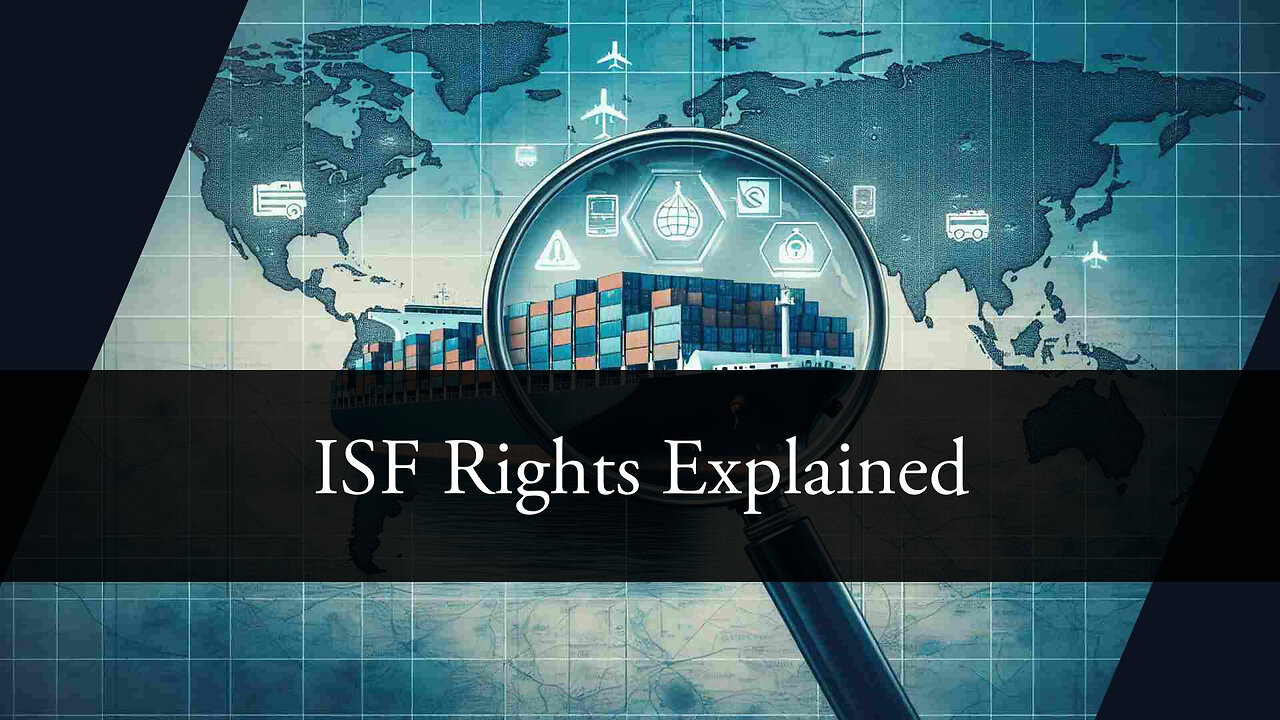Premium Only Content

Mastering the ISF Process: A Guide for Purchasing Agents
* ISF Expert
* Phone: 505-359-0963
* Email: info@isfexpert.com
* https://isfexpert.com
In today's video, we will focus on an important aspect of international trade and customs brokerage – the ISF rights for purchasing agents. The Importer Security Filing (ISF), also known as the 10+2 filing, is a mandatory requirement by US Customs and Border Protection (CBP) for import shipments. While the primary responsibility for filing the ISF lies with the importer, it is essential for purchasing agents to understand their rights and responsibilities in this process.
As a purchasing agent, your role involves gathering and providing accurate information about the goods being imported. This information is vital for both the import process and the ISF filing. Clear and efficient communication channels with the importer are necessary to ensure accurate and timely information exchange.
Although purchasing agents are not directly responsible for filing the ISF, licensed customs brokers handle this task. Customs brokers have expertise in customs regulations and procedures and can provide valuable assistance to purchasing agents in ensuring compliance with ISF requirements. They can accurately complete the ISF filing, submit it to CBP within the designated timeframe, and handle any amendments or updates that may arise.
Having an experienced customs broker as a partner is instrumental in avoiding potential penalties or delays in the import process. Customs brokers can guide purchasing agents through the intricate regulatory landscape, ensuring that all necessary details are included in the ISF filing. They can also address any doubts or questions that may arise during the process.
Effective collaboration between purchasing agents, importers, and customs brokers is vital to streamline the ISF process. Open lines of communication, shared understanding of responsibilities, and timely provision of accurate information are crucial for successful ISF filing. Purchasing agents should proactively communicate with their chosen customs broker, discussing timelines, requirements, and any changes or updates that may arise. Building a strong working relationship can ensure smooth customs clearance and minimize disruptions to the supply chain.
Understanding the rights and responsibilities of purchasing agents in ISF filing is critical for efficient and compliant import operations. By working closely with importers and customs brokers, purchasing agents can navigate the ISF process with confidence and contribute to the seamless movement of goods across borders.
#usimportbond #isfcustomsbroker #uscustomsclearing #isfentry
Video Disclaimer Here: For educational purposes only, No connections to any US government organization.
00:31 - ISF, also known as the 10+2 filing, is a mandatory requirement by U.S. Customs and Border Protection for import shipments.
1:08 - Purchasing agents need to gather and provide accurate information about the goods being imported to ensure smooth customs clearance.
1:46 - While purchasing agents are not directly responsible for filing the ISF, working closely with a licensed customs broker is crucial for compliance.
2:47 - Effective collaboration between purchasing agents, importers, and customs brokers is essential for successful ISF filing and smooth customs clearance.
-
 LIVE
LIVE
Nerdrotic
53 minutes agoHollywood LOST the Culture War! Star Trek Section 31, Disney Lies! | Friday Night Tights #338 w RMB
2,461 watching -
 LIVE
LIVE
Dr Disrespect
5 hours ago🔴LIVE - DR DISRESPECT - TRIPLE THREAT CHALLENGE - NOBODY STOPS US
4,516 watching -
 LIVE
LIVE
Twins Pod
2 hours agoMAGA P***star is HATED By Conservatives AND Leftists... | Twins Pod - Episode 49 - Brandi Love
1,559 watching -
 LIVE
LIVE
Scammer Payback
1 hour agoCalling Scammers Live
693 watching -
 1:10:38
1:10:38
Awaken With JP
2 hours agoJFK Files to be Released! Trump’s Boss Move - LIES Ep 75
17.8K19 -
 1:50:19
1:50:19
The Quartering
3 hours agoTrump NUKES The Deepstate, BANS Trans In Military & Terminates Dr. Fauci Protections!
47.8K40 -
 58:24
58:24
Uncommon Sense In Current Times
18 hours agoUnbreakable: How Jeff Younger Stands Firm Against Courts, Government, and Personal Attacks
79 -
 1:56:01
1:56:01
Nina Infinity
21 hours agoGOOD NEWS - Infinite Hope # 219 | Birthday Stream with Guests!
4.35K -
 15:08
15:08
Silver Dragons
23 hours agoWhat Will the TRUMP Tariffs Will Do to Silver & Gold Price?
4.5K3 -
 19:37
19:37
Neil McCoy-Ward
6 hours ago🚨 The CRAZIEST Moments From Davos 2025... ! 🔥
2.77K5